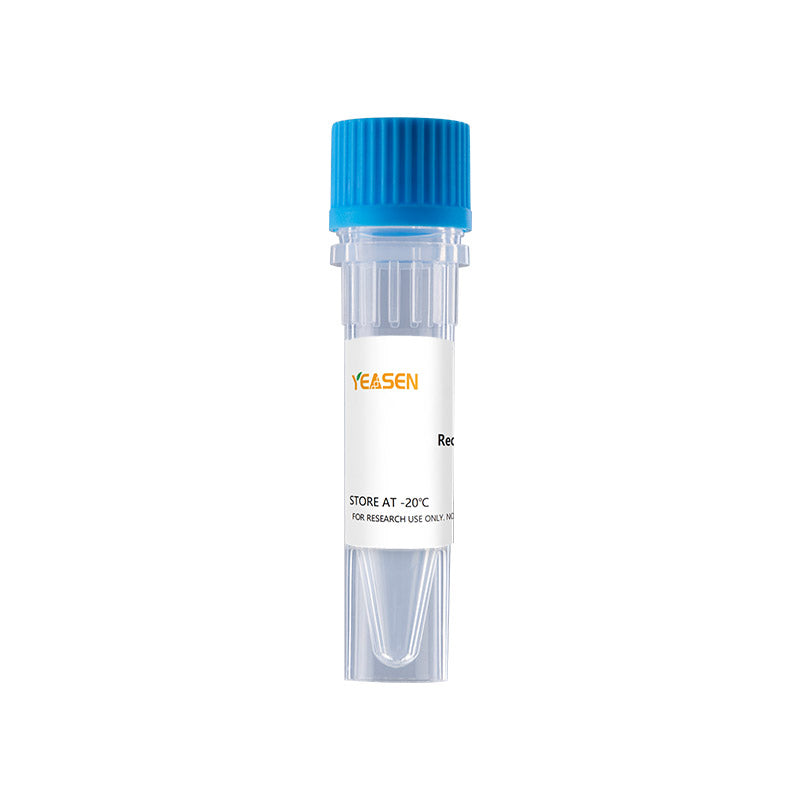Description
IL-13 is a immunoregulatory cytokine that plays a key role in the pathogenesis of allergic asthma and atopy. It is secreted by Th1 and Th2 CD4+ T cells, NK cells, visceral smooth muscle cells, eosinophils, mast cells, and basophils. IL-13 circulates as a monomer with two internal disulfide bonds that contribute to a bundled four alpha -helix configuration. Mature rat IL-13 shares 59%, 75%, and 60% amino acid sequence identity with human, mouse, and rhesus IL-13, respectively. Despite the low homology, it exhibits cross-species activity between human, mouse, and rat. IL-13 has diverse activities on numerous cell types. On macrophages, IL-13 suppresses the production of proinflammatory cytokines and other cytotoxic substances. On B cells, IL-13 induces immunoglobulin class switching to IgE, upregulates the expression of MHC class II, CD71, CD72, and CD23, and costimulates proliferation. IL-13 upregulates IL-6 while downregulating IL-1 and TNF-alpha production by fibroblasts and endothelial cells. IL-13 binds with low affinity to IL-13 R alpha 1, triggering IL-13 R alpha 1 association with IL-4 R alpha. This high affinity receptor complex also functions as the type 2 IL-4 receptor complex. Additionally, IL-13 binds with high affinity to IL-13 R alpha 2 which is expressed intracellularly, on the cell surface, and as a soluble molecule. IL-13 R alpha 2 regulates the bioavailability of both IL-13 and IL-4 and is overexpressed in glioma and several bronchial pathologies. Compared to wild type IL-13, the atopy-associated R110Q variant of IL-13 elicits increased responsiveness from eosinophils that express low levels of IL-13 R alpha 2.
Product Properties
|
Synonyms |
T-cell Activation Protein P600 |
|
Accession |
P42203 |
|
GeneID |
116553 |
|
Source |
E.coli-derived Rat IL-13, 113aa,Thr19-His131. |
|
Molecular Weight |
Approximately 12.3 kDa. |
|
AA Sequence |
TPGPVRRSTS PPVALRELIE ELSNITQDQK TSLCNSSMVW SVDLTAGGFC AALESLTNIS SCNAIHRTQR ILNGLCNQKA SDVASSPPDT KIEVAQFISK LLNYSKQLFR YGH |
|
Tag |
None |
|
Physical Appearance |
Sterile Filtered White lyophilized (freeze-dried) powder. |
|
Purity |
> 98% by SDS-PAGE and HPLC analyses. |
|
Biological Activity |
The ED50 as determined by a cell proliferation assay using human TF-1 cells is less than 5 ng/mL, corresponding to a specific activity of > 2.0 × 105 IU/mg. Fully biologically active when compared to standard. |
|
Endotoxin |
< 1.0 EU per 1μg of the protein by the LAL method. |
|
Formulation |
Lyophilized from a 0.2 μm filtered concentrated solution in 2 × PBS, pH 7.4, 5 % trehalose. |
|
Reconstitution |
We recommend that this vial be briefly centrifuged prior to opening to bring the contents to the bottom. Reconstitute in sterile distilled water or aqueous buffer containing 0.1% BSA to a concentration of 0.1-1.0 mg/mL. Stock solutions should be apportioned into working aliquots and stored at ≤ -20°C. Further dilutions should be made in appropriate buffered solutions. |
Shipping and Storage
The products are shipped with ice pack and can be stored at -20℃ to -80℃ for 1 year.
Recommend to aliquot the protein into smaller quantities when first used and avoid repeated freeze-thaw cycles.
Cautions
1. Avoid repeated freeze-thaw cycles.
2. For your safety and health, please wear lab coats and disposable gloves for operation.
3. For research use only!
Payment & Security
Your payment information is processed securely. We do not store credit card details nor have access to your credit card information.
Inquiry
You may also like
FAQ
The product is for research purposes only and is not intended for therapeutic or diagnostic use in humans or animals. Products and content are protected by patents, trademarks, and copyrights owned by Yeasen Biotechnology. Trademark symbols indicate the country of origin, not necessarily registration in all regions.
Certain applications may require additional third-party intellectual property rights.
Yeasen is dedicated to ethical science, believing our research should address critical questions while ensuring safety and ethical standards.

